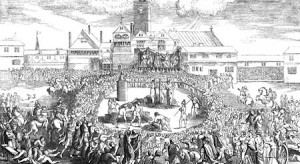 On the 16th July 1546, the Protestant martyrs, Anne Askew, John Lascelles, John Adams and Nicholas Belenian, were burned at the stake at Smithfield in London for heresy.
On the 16th July 1546, the Protestant martyrs, Anne Askew, John Lascelles, John Adams and Nicholas Belenian, were burned at the stake at Smithfield in London for heresy.
Anne Askew had been so badly racked during her imprisonment in the Tower of London that she had to be carried to the stake and was then “tied by the middle with a chain, that held up her body”. Martyrologist John Foxe records the burnings in his book “Actes and Monuments”:
“Hitherto we have entreated of this good woman: now it remaineth that we touch somewhat as touching her end and martyrdom. She being born of such stock and kindred that she might have lived in great wealth and prosperity, if she would rather have followed the world than Christ, but now she was so tormented, that she could neither live long in so great distress, neither yet by the adversaries be suffered to die in secret. Wherefore the day of her execution was appointed, and she brought into Smithfield in a chair, because she could not go on her feet, by means of her great torments. When she was brought unto the stake she was tied by the middle with a chain that held up her body. When all things were thus prepared to the fire, Dr Shaxton, who was then appointed to preach, began his sermon. Anne Askew, hearing and answering again unto him, where he said well, confirmed the same; where he said amiss, “There,” said she, “he misseth, and speaketh without the book.”
The sermon being finished, the martyrs standing there tied at three several stakes ready to their martyrdom, began their prayers. The multitude and concourse of people of the people was exceeding; the place where they stood being railed about to keep out the press. Upon the bench under St Bartholomew’s Church sat Wriothesley, chancellor of England; the old Duke of Norfolk, the old earl of Bedford, the lord mayor, with divers others. Before the fire should be set unto them, one of the bench, hearing that they had gunpowder about them, and being alarmed lest the fa*gots, by strength of the gunpowder, would come flying about their ears, began to be afraid: but the earl of Bedford, declaring unto him how the gunpowder was not laid under the fa*gots, but only about their bodies, to rid them out of their pain; which having vent, there was no danger to them of the fa*gots, so diminished that fear.
Then Wriothesley, lord chancellor, sent to Anne Askew letters offering to her the King’s pardon if she would recant ; who. refusing once to look upon them, made this answer again, that she came not thither to deny her Lord and Master. Then were the letters like-wise offered unto the others, who, in like manner, following the constancy of the woman, denied not only to receive them, but also to look upon them. Whereupon the lord mayor, commanding fire to be put unto them, cried with a loud voice, “Fiat justicia.”
And thus the good Anne Askew, with these blessed martyrs being troubled so many manner of ways, and having passed through so many torments, having now ended the long course of her agonies, being compassed in with flames of fire, as a blessed sacrifice unto God, she slept in the Lord A.D. 1546, leaving behind her a singular example of christian constancy for all men to follow.”
You can read more about Anne Askew in my article 18 June 1546 – Anne Askew Sentenced to Death.
More Burnings – The Newbury Martyrs
Also on this day in history, but in 1556, Julins Palmer, John Gwyn, and Thomas Robyns [some sources say Askew or Askin], were burned at the stake in the old sandpits in Enborne Road, Newbury. They had been found guilty of sedition and heresy in a trial at St Nicholas Church, Newbury, and condemned to death. John Foxe records their deaths too:
“They put off their raiment and went to the stake, and kissed it; and when they were bound to the post, Palmer said, ‘Good people, pray for us that we may persevere unto the end, and for Christ his sake beware of Popish teachers, for they deceive you.’ As he spake this, a servant of one of the Bailiffs threw a fa*got at his face, that the blood gushed out in divers places. For the which fact the Sheriff broke his head, that the blood likewise ran about his ears. When, the fire was kindled and began to take hold of their bodies, they lift their hands towards heaven, and quietly and cheerfully, as though they felt no smart, they cried, ‘ Lord Jesu, strengthen us ; Lord Jesu, assist us; Lord Jesu, receive our souls.’ And so they continued, without any struggling, holding up their hands and knocking their hearts, and calling upon Jesu until they had ended their mortal lives.”
Notes and Sources
- The Actes and Monuments of John Foxe, a new and complete edition, John Foxe
- The Newbury Martyrs, Royal Berkshire History, David Nash Ford
- www.thenewburymartyrs.org.uk